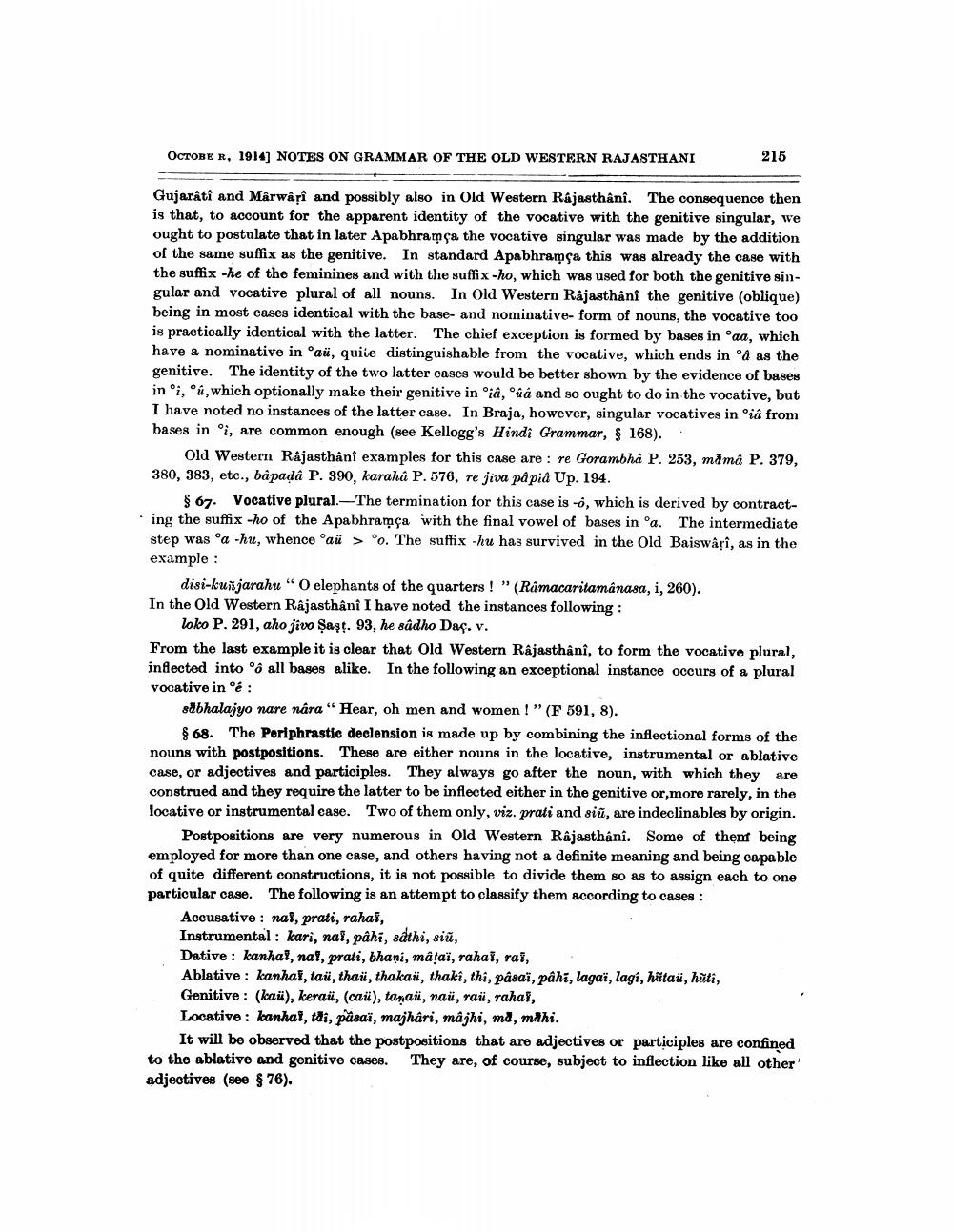________________
OCTOBER, 1914) NOTES ON GRAMMAR OF THE OLD WESTERN RAJASTHANI
215
Gujarati and Marwari and possibly also in Old Western Rajasthânî. The consequence then is that, to account for the apparent identity of the vocative with the genitive singular, we ought to postulate that in later Apabhramça the vocative singular was made by the addition of the same suffix as the genitive. In standard Apabhramsa this was already the case with the suffix the of the feminines and with the suffix-ho, which was used for both the genitive singular and vocative plural of all nouns. In Old Western Rajasthani the genitive (oblique) being in most cases identical with the base- and nominative- form of nouns, the vocative too is practically identical with the latter. The chief exception is formed by bases in oaa, which have a nominative in oaü, quite distinguishable from the vocative, which ends in 'â as the genitive. The identity of the two latter cases would be better shown by the evidence of bases inoi, °ú, which optionally make their genitive in oza, 'ua and so ought to do in the vocative, but I have noted no instances of the latter case. In Braja, however, singular vocatives in oia from bases in "i, are common enough (see Kellogg's Hindi Grammar, $ 168)..
Old Western Rajasthani examples for this case are: re Gorambha P. 253, mamá P. 379, 380, 383, etc., bâpada P. 390, karaha P. 576, re jiva på pia Up. 194.
$ 67. Vocative plural.-The termination for this case is -, which is derived by contract. ing the suffix-ho of the Apabhramça with the final vowel of bases in oa. The intermediate
step was 'a-hu, whence "aü > 'o. The suffix-hu has survived in the Old Baiswârî, as in the example :
disi-kunjarahu" O elephants of the quarters ! " (Ramacaritamanasa, i, 260). In the Old Western Rajasthânî I have noted the instances following:
loko P. 291, ahojivo Şaşt. 93, he sudho Dac. v. From the last example it is clear that Old Western Rajasthani, to form the vocative plural, inflected into all bases alike. In the following an exceptional instance occurs of a plural vocative iné :
Sdbhalajyo nare nara" Hear, oh men and women !" (F 591, 8).
$ 68. The Periphrastic declension is made up by combining the inflectional forms of the nouns with postpositions. These are either nouns in the locative, instrumental or ablative case, or adjectives and participles. They always go after the noun, with which they are construed and they require the latter to be inflected either in the genitive or more rarely, in the locative or instrumental case. Two of them only, viz. prati and siū, are indeclinables by origin.
Postpositions are very numerous in Old Western Rajasthani. Some of thenf being employed for more than one case, and others having not a definite meaning and being capable of quite different constructions, it is not possible to divide them so as to assign each to one particular case. The following is an attempt to classify them according to cases :
Accusative: nal, prati, rahal, Instrumental : kari, nal, pâhi, sáthi, siū, Dative : kanhal, nai, prati, bhani, mâtaï, rahai, rap, Ablative : kanhal, taü, thai, thakaü, thaki, thi, pasai, pâhi, lagaï, lagi, hūtai, huli, Genitive : (kaü), keraü, (caü), tanaú, naü, raü, rahal, Locative : kanhai, tdi, pasaï, majhâri, mâjhi, md, mihi.
It will be observed that the postpositions that are adjectives or participles are confined to the ablative and genitive cases. They are, of course, subject to inflection like all other adjectives (see $ 76).




